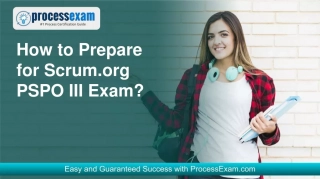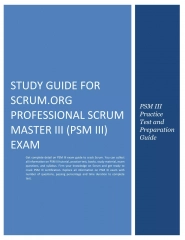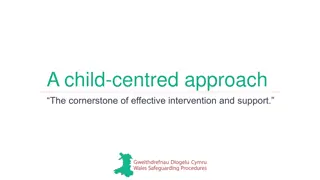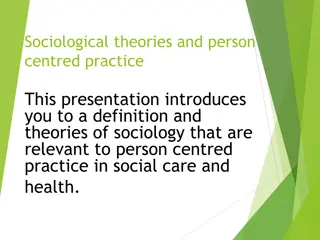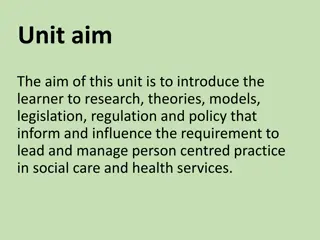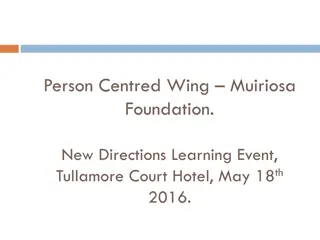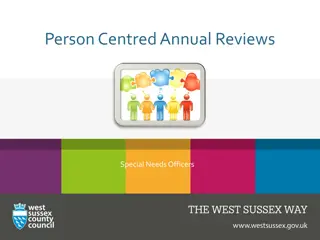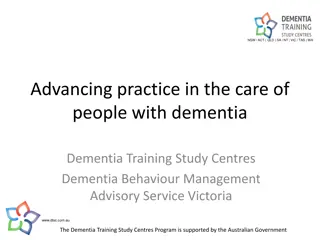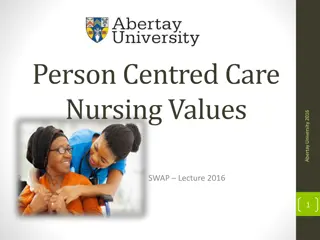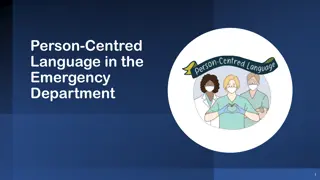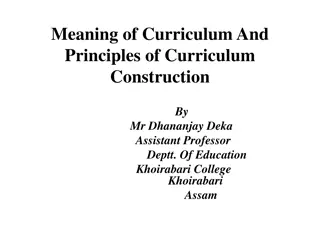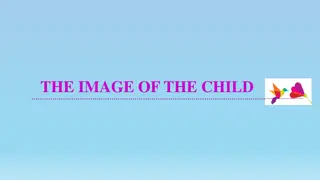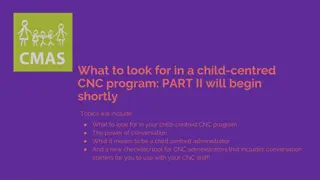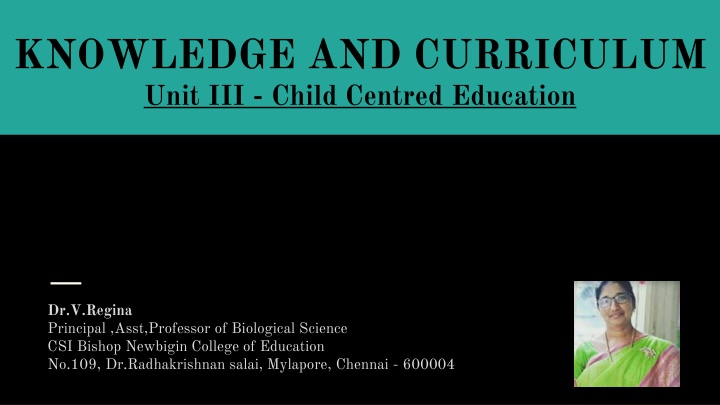
Child-Centred Education: Characteristics and Philosophies
Explore the definition, characteristics, and key educational thoughts shaping child-centred education, with insights from Mahatma Gandhi, Rabindranath Tagore, Plato, Martin Buber, Paulo Freire, and John Dewey. Learn about the importance of student-directed learning, individual needs, and all-round development in a child's education.
Download Presentation

Please find below an Image/Link to download the presentation.
The content on the website is provided AS IS for your information and personal use only. It may not be sold, licensed, or shared on other websites without obtaining consent from the author. If you encounter any issues during the download, it is possible that the publisher has removed the file from their server.
You are allowed to download the files provided on this website for personal or commercial use, subject to the condition that they are used lawfully. All files are the property of their respective owners.
The content on the website is provided AS IS for your information and personal use only. It may not be sold, licensed, or shared on other websites without obtaining consent from the author.
E N D
Presentation Transcript
KNOWLEDGE AND CURRICULUM Unit III - Child Centred Education Dr.V.Regina Principal ,Asst,Professor of Biological Science CSI Bishop Newbigin College of Education No.109, Dr.Radhakrishnan salai, Mylapore, Chennai - 600004
Definition Characteristics of child centred education Freedom Self-activities Process of spontaneous development Development of interest and needs Education based on experience Educational thoughts of Mahatma Gandhi Synopsis Educational thoughts of Rabindranath Tagore Educational thoughts of Plato Educational thoughts of Martin Buber Educational thoughts of Paulo Freire Educational thoughts of John Dewey Conclusion Suggested Readings Dr. V. Regina , Principal CSI BISHOP NEWBIGIN COLLEGE OF EDUCATION
To improve in students learning programmes by themselves Learning Objectives To implement students needs and requirements To encourage to actively search for knowledge and to carry out complex learning activities Inspire students to explore what they are most curious about. Learner directs their own learning fostering a curiosity that will Learning Outcomes stick with them for life. Every learner response better to a different learning styles Dr. V. Regina , Principal CSI BISHOP NEWBIGIN COLLEGE OF EDUCATION
Mahatma Gandhi: Education should be of developing the integrated personality of the child (life centred). Definition Rabindranath Tagore: Education should be of gradual and progressive growth of a child. Plato: Education should be of welfare of both the child and the society. Student - Centred education or learner-centred education is Martin Buber: also called child - centred education is an approach to Education should be of community and important thinker for education which focus on the needs of the students, rather educators. than those of others involved in the educational process such Paulo Freire: as teachers and administrators. Education should be of child with a lot of Rote - learned information. John Dewey: Education should be of individual needs of the child. Dr. V. Regina , Principal CSI BISHOP NEWBIGIN COLLEGE OF EDUCATION
Characteristics of Child- centred education 3.Education: The fundamental right every child is education , no matter whatever is his social and economic background. 1.Dignity of the Child: The spirit of child-centred education upholds the dignity of 4.Curriculum, syllabus, teaching: the child in the academic and social fabric such a system of Organised in accordance with the needs and interests education gives due respect to individuality of the child. of children. 2. No Discrimination: 5.All round Development of child : Child-Centred education is above caste, creed, sex and Child-centered aims at total, all round development education is above caste, creed, sex and economic and social of children, which leads to his/her cognitive, affective & background of the child. There is no place for discrimination of cognitive development. any kind in child-centred education. Dr. V. Regina , Principal CSI BISHOP NEWBIGIN COLLEGE OF EDUCATION
Characteristics of Child- centred education 6..Positive discipline: 9. Not self- pedagogy: Child centred education condemns corporal punishment and Child centred ethos in the school under which child s enforcing rules of discipline, child s dignity and individuality right to education must be recognised. must be respected. 7. Condition Evaluation: Child s deficiencies are identified and remedial measures are 10. The teacher is important too: instituted in progressive manner. Child-centered approach to education in no way minimises the important of the teacher. 8.Helping every child to acquire minimum level of learning: A Teacher making use of child-centered approach ensures that each and every child acquires the minimum level of competencies in all the subjects, Dr. V. Regina , Principal CSI BISHOP NEWBIGIN COLLEGE OF EDUCATION
Educational Thoughts of Mahatma Gandhi Education for life, through life throughout life. Truth, non-violence, fearlessness satyagraha. Self - realization total personality. To achieve mental development training of senses and parts of the body should be given. Basic education: He mainly aims at the education Reading should precede the teaching of writing. in mother tongue To make the children skilled and independent Education is a harmonious blending of idealism, nationalism and pragmatis. Dr. V. Regina , Principal CSI BISHOP NEWBIGIN COLLEGE OF EDUCATION
Educational Thoughts of Mahatma Gandhi Education for life, through life throughout life. Truth, non-violence, fearlessness satyagraha. Self - realization total personality. To achieve mental development training of senses and parts of the body should be given. Basic education: He mainly aims at the education Reading should precede the teaching of writing. in mother tongue To make the children skilled and independent Education is a harmonious blending of idealism, nationalism and pragmatis. Dr. V. Regina , Principal CSI BISHOP NEWBIGIN COLLEGE OF EDUCATION
Educational Thoughts of Mahatma Gandhi Education should employ some craft as a medium of education so that the child grains economic self- reliance for his life. Education should develop human values in the child 7 to 14 years of age, education of each child Education should create useful,responsible and should be free, compulsory and universal dynamic citizens. The medium of instruction should be their own Education should achieve the harmonious mother tongue development of child s body, mind, heart and soul. Mere literacy cannot be equated with education. Dr. V. Regina , Principal CSI BISHOP NEWBIGIN COLLEGE OF EDUCATION
Educational Thoughts of Rabindranath Tagore Living ideals cannot be set into clockwork arrangement. The teacher is Guru Mother tongue must be the medium of instruction. Education is short of the highest purpose of man,the fullest growth and freedom. There is well- equipped library. The objective of education is the freedom of mind which can only be achieved through the path of education. Children's subconscious mind is more active than their conscious intelligence. Dr. V. Regina , Principal CSI BISHOP NEWBIGIN COLLEGE OF EDUCATION
Educational Thoughts of Rabindranath Tagore Love for humanity : education should teach people to realise oneness. Freedom : Education is a man - making process. Correlation of objects: a peaceful world is only possible when correlation between man and nature Self - realisation - spiritual is the essence of will be established. humanism. Moral and spiritual development Intellectual development- development of imagination, creative, free thinking, constant Social development : Brotherhood should be curiosity alertness of the mind. cultivated from the beginning of life Physical development- sound and healthy physique through yoga , games Dr. V. Regina , Principal CSI BISHOP NEWBIGIN COLLEGE OF EDUCATION
Educational Thoughts of Plato Knowledge of good, to nurture a man to a better human being, it is not merely an awareness of particular benefits and pleasures. Education must begin at the age of seven.. To develop leader among the future rulers. Ethics is the most important branch of philosophy, To develop hard and competent workers ethical education was his motto. To produce leaders with military skill among warriors. To produce future civil servants of the state. Dr. V. Regina , Principal CSI BISHOP NEWBIGIN COLLEGE OF EDUCATION
Educational Thoughts of Plato Women education - women are equal to men. Learning by doing was the teaching method. Knowledge which is acquired under compulsion Elementary school till the age of 18 with music , obtains no hold on the mind. literature , poetry and mathematics. A child should play amongst lovely things. Military training - after elementary two years of physical education should be given. Higher education - 20 to 25 years is an indispensable necessity of humankind. Dr. V. Regina , Principal CSI BISHOP NEWBIGIN COLLEGE OF EDUCATION
Educational Thoughts of Martin Buber Theory of learning: A genuine speaking and listening is essential for all the true communication for truly effective learning and ultimately for the entire pursuit of truth. Theory of transmission : Cultural and spiritual Theory of value: Children must be taught to explore heritage should be transmitted to children. their two autonomous instincts Objective knowledge Active Knowledge Theory of Society: Creating community spirit Theory of knowledge: knowledge of self and Theory of opportunity : Grow aware of the world. knowledge of reality needed. Theory of human nature: Freedom for self development and growth of human. Dr. V. Regina , Principal CSI BISHOP NEWBIGIN COLLEGE OF EDUCATION
Educational Thoughts of Martin Buber Children are not the people of tomorrow, but people of today. They should be allowed to grow into whoever they were meant to be. They are entitled to be taken seriously. The learner is the primary focus of the learning. Experiential learning is more than just a series of The teacher instructor. experience that a learner undergoes. Education is not the preparation for life ; Education is life itself. Dr. V. Regina , Principal CSI BISHOP NEWBIGIN COLLEGE OF EDUCATION
Educational Thoughts of Paulo Freire Pedagogy of Hope - Reading the word cannot be the word. Pedagogy of the freedom - Educational practice a communication. Education as practice of freedom - learning begins The politics of education: Education is always a with action. political act cannot be neutral. Pedagogy of the oppressed - Education is a cultural Dialogue as a pedagogical tool. tool for liberation from oppression. Education for critical consciousness, critical understanding of reality. Dr. V. Regina , Principal CSI BISHOP NEWBIGIN COLLEGE OF EDUCATION
Educational Thoughts of Paulo Freire Egalitarian teacher - student relations. Education for liberation. Education for conscientization Education for posing education.. To Act - To Analyse - To Act : are the methodology. Transformative social justice learning . Find the problems. Produce the codes - create a play or skit. Dr. V. Regina , Principal CSI BISHOP NEWBIGIN COLLEGE OF EDUCATION
Educational Thoughts of John Dewey The role of a teacher is more like a facilitator than an instructor.. Experiential Education. Progressive Education - Learning through hands- on approach learning by doing pragmatism. Enquiry based Education . Learning emphasis is the needs and interests of the Instrumentalism. child.. Children should be allowed to explore their environments. Dr. V. Regina , Principal CSI BISHOP NEWBIGIN COLLEGE OF EDUCATION
Educational Thoughts of John Dewey Students should be actively involved in real-life tasks and challenges. Experimental school.. Curriculum - centered view of education rejected and interests and experiences of students accepted.. Problem solving method of learning Define Reflect social life. Analyze Teacher facilitator and guide. Determines Propose Existentialism, Behaviorism, Constructivism his philosophies of education. Evaluate Select Implement.: Dr. V. Regina , Principal CSI BISHOP NEWBIGIN COLLEGE OF EDUCATION
The utilization of knowledge will often occur in subsequent learning situations within the school itself and the competences acquired by the child will often be the skilled use of concepts, facts and principles as well as the mastery of motor skills. Conclusion Learning by doing is essential to the acquisition knowledge as a personal possession of each and every individual. Dr. V. Regina , Principal CSI BISHOP NEWBIGIN COLLEGE OF EDUCATION
Suggestive Readings Fagg.H(2006), A stuy of Gandhi s Basic Education, New Delhi: National Book Trust. Mark K. Smith, Martin Buber on education . The encyclopedia of informal education(2000) hhtp://www.visva.bharati.com: beethovens_silence.mp3 Dr. V. Regina , Principal CSI BISHOP NEWBIGIN COLLEGE OF EDUCATION


